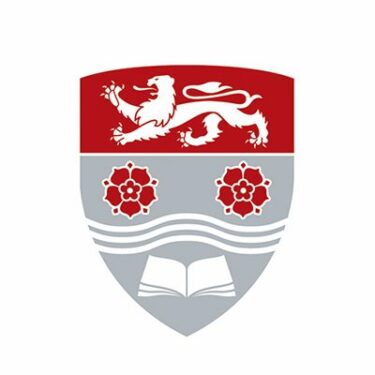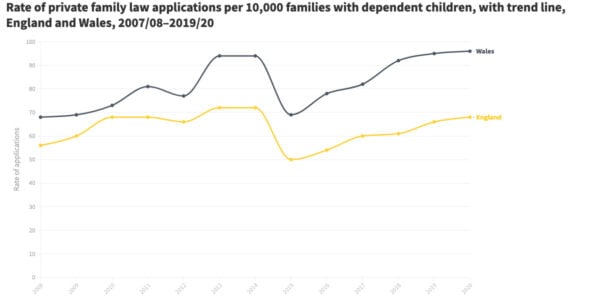Summary
This summary highlights the main findings of the first report in the Uncovering Private Family Law series. The research was carried out by the Family Justice Data Partnership—a collaboration between the University of Lancaster and the University of Swansea—in conjunction with Professor Liz Trinder, University of Exeter.
Disputes between parents over child arrangements following family separation make up a significant proportion of cases within the family justice system. There is concern about the level of private law demand in England and Wales, with a perception that too many parents are becoming over-reliant on the courts to resolve personal disputes (Private Law Working Group 2019; McFarlane 2019).
This summary highlights the main findings of a research report that examines trends in demand in Wales, bringing new evidence to this debate. It develops a demographic profile of the families involved, including levels of deprivation, the patterns of orders applied for, and the proportion of repeat applications. In doing so, it enables us to better understand the characteristics, needs and vulnerabilities of the families involved in private law cases.
The report is the first of its kind to use population-level data in private family law in Wales, linked to demographic data, and is the first in the Uncovering Private Family Law series, which aims to build a profile of families in private law proceedings, and their pathways and outcomes in England and Wales.
What are ‘private law children cases’ or ‘proceedings’?
Where parents (or other carers) cannot agree arrangements for their children, one or both may make an application to the court for an order under the Children Act 1989. There are a range of orders available for different circumstances. The most common is a child arrangements order (CAO), which is to regulate arrangements relating to where a child should live and/or who they should see.
Where did the data come from?
This study uses anonymised administrative data from Cafcass Cymru, which is linked to demographic and deprivation data using the highly secure systems for linkage and anonymisation established by the SAIL Databank (Ford et al. 2009; Lyons et al. 2009).
The study includes all private law applications made to the family court in Wales between 2007 and 2018. Information about the legal orders applied for—and the applicants, respondents, and subjects involved—were included for applications issued between 2011 and 2018.
Key research findings
Currently, the evidence base to inform policy and practice in England and Wales is much less developed for private than public family law, even though there are more than twice as many private law cases each year. There has been no major research on private law cases in Wales.
Our analysis has confirmed for Wales what we already know for England from existing research— the majority of private law cases are: between two parents; usually brought by the non-resident parent, most often the father; and concern a single child, aged predominantly between one and nine years old. The adults involved in private law proceedings are mainly in their late-twenties and thirties.
Use of the court remains low, although overall the trend in the volume of private law applications has been modestly upwards over the last decade
- In 2007, there were 2,440 private law applications. This rose to 3,800 in 2013, then fell significantly following the legal aid changes introduced that year. The number of applications has now virtually recovered to previous levels, with 3,390 applications made in 2018.
- The removal of legal aid entitlement (except for certain cases involving domestic abuse) appears to have mainly delayed or paused applications rather than reducing the levels of need for assistance over the longer term.
- Fewer than 1% of all family households in Wales (including intact and separated families) make a private law application each year.
About a third of applications are returns to court
- Between 31% and 34% of private law applications between 2014 and 2018 were made by an applicant who had been involved in a previous application within the last three years.
- Mothers are somewhat more likely to be involved in a return to court.
- Fathers are more likely to be repeat applicants, whilst mothers are more likely to be subject to repeat applications, or to issue their own applications after being subject to a previous application.
There is a clear link between deprivation and private law applications, which indicates that the economic vulnerability of private law parents has been previously overlooked
- In 2018, 29% of fathers and 33% of mothers making a private law application lived in the most deprived quintile, with 51% of fathers and 56% of mothers living in the two most deprived quintiles.
- As with public law cases, levels of need and trends vary by geographic area, with the highest rates of private family law applications seen in Swansea and South West Wales.
There is some evidence of a ‘justice gap’ following legal aid changes
- There was a reduction in the proportion of applications brought by fathers, by younger applicants, and by fathers living in the most deprived areas from 2013 onwards. This is consistent with the emergence of a ‘justice gap’ following the removal of legal aid from most private law cases in 2013.
While the overall private law population is broadly stable, there are some changes in what is being applied for
- The majority of private law applications continue to be for child arrangements orders (CAOs).
- There have been proportional increases in applications for ‘other’ private law orders over the last few years. Applications for enforcement, prohibited steps and specific issues orders increased from 15% of all parental applications in 2011 to 30% in 2018.
- These ‘other’ orders represent quite a significant shift in the workload for the family justice system towards what may be more challenging or contentious cases.
Data gaps and future priorities
The Uncovering Private Family Law series aims to develop a comprehensive profile of the children and adults entering the family justice system in both England and Wales, their pathways, experiences and outcomes, making use of administrative data linkage opportunities within the SAIL Databank.
Our immediate research priorities include the following.
- A comparison between private law cases in England and Wales, including profiles of the individuals involved, application types and returns to court.
- A more in-depth look at the pre-court needs and vulnerabilities of adults and children, including the prevalence of mental health difficulties, domestic abuse and other child protection issues. A key priority will be to explore the overlap between public and private law cases.
- Work to differentiate types of private law cases and pathways of adults and children, including more detailed analysis of returner cases and those where the child is separately represented (known as ‘Rule 16.4’ cases). The use of large-scale linked data (health, welfare and further demographic) could shed more light on what might distinguish the profiles of single, repeat, and multiple (or chronic) users. This would enable earlier identification and intervention to prevent what would otherwise be chronic cases from becoming entrenched.
- A deeper dive into different case types, particularly the non-standard cases about which there is very little prior research: those with two or more applicants and/or two or more respondents; and those including orders other than those for child arrangements.
Recommendations
While this programme of work is still in its early stages, the following four policy and practice implications seem clear at this point.
- This research has established that private law cases disproportionately involve people living in more deprived areas. It is critical that policymakers now give due consideration to the role of deprivation as a factor in private law cases and its interaction with other factors such as conflict, domestic abuse and other child protection issues. This will be a critical step in informing—and possibly reshaping—the response to private law need in both court and out- of-court contexts.
- The research has highlighted some reductions in private law applications from fathers, from younger applicants, and from those living in the most deprived areas following the legal aid reforms in 2013. We recommend that the Ministry of Justice reviews this evidence, alongside other analyses it may have, to reflect on whether access to justice is being inhibited and what might be done to address that.
- The majority of private law proceedings involve a single child or two siblings. Sibling support is a well-documented resilience factor for children that will be missing in large numbers of private law cases. In addition to addressing the dispute between adults, the research highlights the importance of making support available for children.
- We recommend that Cafcass Cymru, ideally in concert with Cafcass England, continues to test and implement a process to record in its database: whether there are allegations of domestic abuse and other safeguarding concerns; each adult’s relationship to the child and other adult(s); and, ideally, the child’s living arrangements at the time of application. It would also be of benefit if CAOs were recorded as ‘spend time with’ or ‘live with’.
References
Cusworth, L. et al. (2020). Uncovering private family law: Who’s coming to court in Wales. London: Nuffield Family Justice Observatory.
Ford, D. V, Jones, K.H., Verplancke, J.P., Lyons, R.A., John, G., Brown, G., Brooks, C.J., Thompson, S., Bodger, O., Couch, T. and Leake, K. (2009). The SAIL Databank: Building a national architecture for e-health research and evaluation. BMC Health Services Research, 9.
Lyons, R.A., Jones, K.H., John, G., Brooks, C.J., Verplancke, J.P., Ford, D. V, Brown, G. and Leake, K. (2009). The SAIL databank: Linking multiple health and social care datasets. BMC Medical Informatics and Decision Making, 9(1).
McFarlane, A. (2019). Living in interesting times: Keynote address to Resolution Conference.
Ministry of Justice. (2020). Assessing risk of harm to children and parents in private law children cases – Final Report. London: Ministry of Justice.
Private Law Working Group. (2019). A review of the Child Arrangement Programme [PD12B FPR 2010]. London: Report to the President of the Family Division, High Court of Justice.
See the main report for the full list of studies that informed the review.
Organisations
-
 Lancaster University
Lancaster University -
 The Centre for Child and Family Justice Research
The Centre for Child and Family Justice Research -
 Population Data Science at Swansea University
Population Data Science at Swansea University -
 SAIL Databank
SAIL Databank -
 University of Exeter
University of Exeter











